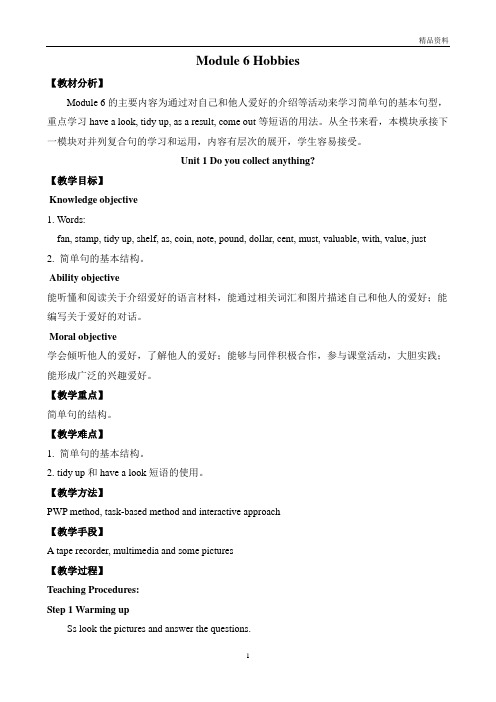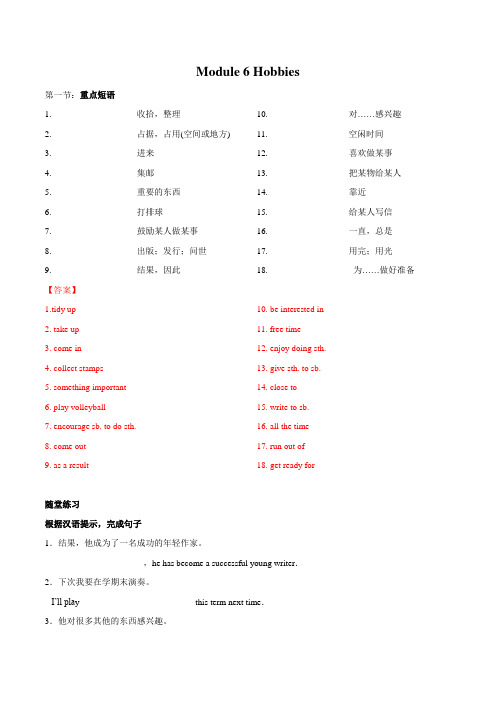Revision for Module 6 Hobbies
- 格式:doc
- 大小:22.00 KB
- 文档页数:2


外研版英语八下Module 6《Hobbies》说课稿一. 教材分析《Hobbies》是外研版英语八年级下册Module 6的一篇课文,主题是关于兴趣爱好的。
通过本课的学习,学生可以了解不同人的兴趣爱好,提高口语表达能力,培养跨文化交流的意识。
本文主要介绍了一位喜欢旅游的人和他的旅行经历,以及另一位喜欢集邮的人和他的邮票收藏。
通过这篇课文,学生可以了解到兴趣爱好对人们生活的影响,以及如何与人分享自己的兴趣爱好。
二. 学情分析根据我对学生的了解,他们已经具备了一定的英语基础,能够听懂并运用一些基本的英语句型。
但是,学生在口语表达方面还存在一定的困难,尤其是在描述自己的兴趣爱好方面。
此外,部分学生可能对旅行和集邮这些话题较为陌生,需要老师在课堂上进行引导和拓展。
三. 说教学目标1.知识目标:学生能够听懂、读懂并运用本课中的关键词汇和句型,如“hobby”、“collection”、“stamp”等。
2.能力目标:学生能够用英语描述自己的兴趣爱好,并进行简单的交流。
3.情感目标:学生能够认识到兴趣爱好对生活的重要性,培养积极的生活态度。
四. 说教学重难点1.重点:学生能够掌握本课中的关键词汇和句型,并运用到实际交流中。
2.难点:学生能够用英语描述自己的兴趣爱好,并进行流畅的交流。
五. 说教学方法与手段1.交际法:通过小组讨论、角色扮演等方式,让学生在实际语境中运用所学知识。
2.任务型教学法:通过完成各种任务,激发学生的学习兴趣,提高学生的参与度。
3.多媒体辅助教学:利用图片、视频等资源,丰富教学手段,提高学生的学习兴趣。
六. 说教学过程1.导入:教师通过提问方式引导学生谈论自己的兴趣爱好,为新课学习做好铺垫。
2.新课呈现:教师展示课文图片,引导学生预测课文内容。
然后播放课文录音,让学生跟读并模仿语音语调。
3.课文讲解:教师讲解课文中的关键词汇和句型,让学生进行实际操作练习。
4.拓展活动:教师学生进行小组讨论,让学生分享自己的兴趣爱好,并用英语进行描述。

外研版八下Module 6 Hobbies 要点精析一、短语积累1. come out 出版;问世2. as a result结果;因此3. have a look 看一看4. tidy up使整齐;使整洁5. make sb. do sth.让某人做某事6. such as例如7. encourage sb. to do 鼓励某人做某事8. be interested in对……感兴趣9.find somewhere to sit down 找地方坐10. something important 重要的事11.an old box of my father’s 我父亲的一个旧盒子12.不如not as…as…13.run out of用光;14.占用take up15.some…others…一些…另一些…16.tell stories讲故事17.back at school回到学校18.outdoor activities户外活动19.bring sb.sth.=bring sth.to sb. 给某人带来…20.not only...but also…不仅…而且…21.in my spare time 在我的业余时间22.develop your interests培养兴趣23.look forward to doing sth. 盼望做…二、句型积累1. They must be really valuable. 他们一定很值钱。
2. The students are all looking forward to meeting you. 学生们都盼望看到你。
3. As well as the usual actities, such as sailing and climbing, there was a writing class.除了日常的活动,如帆船、爬山,还有一个写作班。
4. Many young people love his book, and as a result, David has become a successful young writer.许多年轻人喜欢他的书,因此,戴维成为了一名成功的年轻作家。

Module 6 Hobbies Unit 1Do you collect anything?单词卡片名词: fan, stamp, shelf, coin, note, pound, dollar, value 情态动词: must形容词: valuable副词: just介词: as, with短语归纳tidy up, take up, sit down, a bit of, on the shelf, have a look, so many, something important句型再现1. Sorry, it's a bit of a mess.2. Let me have a look.3. They must be really valuable.4. I'll show you my stamps too.5. My hobby doesn't cost as much as yours—I collect tickets, bus tickets and train tickets!6. People also collect things just to remember something important in their lives.Unit 2Hobbies can make you grow as a person. & Unit 3单词卡片名词: person, interest, skill, activity, sailing, result, pleasure, success短语归纳look after, as well as, such as, ask sb. to do sth., encourage sb. to do sth., come out, as a result, be interested in, spend…doing sth.句型再现1. Some hobbies are relaxing and others are active.2. Hobbies can make you grow as a person, develop your interests and help you learn new skills.3. As well as the usual activities, such as sailing and climbing, there was a writing class.4. Then she encouraged us to write about our experiences at the camp.5. Many young people love his book, and as a result, David has becomea successful young writer.6. I spend some of my free time playing volleyball for my school team. 7.They not only enjoy the weekend, but also learn a lot about life in the old days.教材内容解读本模块以“爱好”为话题,主要谈论个人爱好和爱好及缘由,表达喜爱和不喜爱,以及对各类爱好的归类选择和简洁评价。

Module 6 Hobbies【教材分析】Module 6的主要内容为通过对自己和他人爱好的介绍等活动来学习简单句的基本句型,重点学习have a look, tidy up, as a result, come out等短语的用法。
从全书来看,本模块承接下一模块对并列复合句的学习和运用,内容有层次的展开,学生容易接受。
Unit 1 Do you collect anything?【教学目标】Knowledge objective1. Words:fan, stamp, tidy up, shelf, as, coin, note, pound, dollar, cent, must, valuable, with, value, just2. 简单句的基本结构。
Ability objective能听懂和阅读关于介绍爱好的语言材料,能通过相关词汇和图片描述自己和他人的爱好;能编写关于爱好的对话。
Moral objective学会倾听他人的爱好,了解他人的爱好;能够与同伴积极合作,参与课堂活动,大胆实践;能形成广泛的兴趣爱好。
【教学重点】简单句的结构。
【教学难点】1. 简单句的基本结构。
2. tidy up和have a look短语的使用。
【教学方法】PWP method, task-based method and interactive approach【教学手段】A tape recorder, multimedia and some pictures【教学过程】Teaching Procedures:Step 1 Warming upSs look the pictures and answer the questions.Step 2 New wordsLook and say. The teacher shows the pictures of new words and let the students to say as quickly as possible.fan, stamp, shelf, tidy up, have a look at, coin, note, pound, dollar, must, valuableStep 3 Listening1. Listen and find out who collects the things in the pictures.Keys: Tony: a, c Tony’s father: b, c Tony’s mum: d, e2. Answer the questions. Use the words and expression in the box to help you.1) What does Tony’s mum want him to do?2) Which hobby does Tony think is expensive?3) Which hobby do you think takes up the most space?Keys: 1) She wants him to tidy up his room.2) Tony thinks stamp-collecting is expensive.3) I think collecting toy cars takes up the most space.Step 4 Reading1. Listen to the conversation and answer the following questions.1) Where did Lingling get fans?2) Are the coins and notes valuable?Keys: 1) People often give Lingling fans as presents.2) Yes, they are.2. Read the dialogue and mark T or F.1) There are about sixty fans in Lingling’s house.2) Lingling collects British pounds and US dollars.3) Betty collects six or seven books of stamps from all over the world.Keys: T, F, T3.Now complete the notes.Lingling’s hobby: ___________________Betty’s hobbies: ____________________Tony’s hobby: ______________________Keys: 1) collecting fans2) collecting coins and notes, collecting stamps3) collecting bus and train ticketsStep 5 Everyday EnglishSorry, it’s a bit of a mess.Let me have a look.Can I see them?Right!Step 6 Language points1. Which hobby do you think takes up the most space?take up 占用,从事e.g. They take up too much space. 它们占了太多空间。

Module 6 Hobbies 第一节:重点短语1. ___________________收拾,整理2. ___________________占据,占用(空间或地方)3. ___________________进来4. ___________________集邮5. ___________________重要的东西6. ___________________打排球7. ___________________鼓励某人做某事8. ___________________出版;发行;问世9. ___________________结果,因此10. __________________对……感兴趣11. __________________空闲时间12. __________________喜欢做某事13. __________________把某物给某人14. __________________靠近15. __________________给某人写信16. __________________一直,总是17. __________________用完;用光18. ___________________为……做好准备【答案】1.tidy up2. take up3. come in4. collect stamps5. something important6. play volleyball7. encourage sb. to do sth.8. come out9. as a result 10. be interested in11. free time12. enjoy doing sth.13. give sth. to sb.14. close to15. write to sb.16. all the time17. run out of18. get ready for随堂练习根据汉语提示,完成句子1.结果,他成为了一名成功的年轻作家。
Module 6 HobbiesUnit 1 Do you collect anything?【对话翻译】玲玲:嗨,大家好!进来找地方坐下。
不好意思,(家里)有点乱。
我来把这些扇子放到架子上。
贝蒂:让我看一看。
你有这么多扇子。
玲玲:是啊,大约六十把。
贝蒂:你从哪儿得到它们的?玲玲:它们大部分是礼物。
大家经常给我扇子作为礼物,因为他们知道我喜欢扇子。
你收集什么东西吗?贝蒂:是的,我收集硬币和纸币,你知道,比如英镑和美元。
玲玲:硬币?它们一定很值钱。
我可以看看它们吗?贝蒂:当然可以!我还要给你看看我的邮票。
我收集了世界各地的邮票。
我已经有六七本集邮册了。
托尼:我的爱好没有你们的那么费钱——我收集票、公共汽车票和火车票!贝蒂:用废弃的票你不能做任何事情!托尼:我知道,但当我看到它们时,我会记起一些美好的地方。
玲玲:是的!它们的价值并不总是重要的。
人们也收集东西而仅仅为记住他们生命中某些重要的事情。
Module 6 HobbiesUnit 2 Hobbies can make you grow as a person.课文翻译:戴维的爱好很多学生都有爱好,比如阅读、绘画、种菜和照看动物。
有些爱好是休闲的,有些是忙碌的。
爱好可以促使你成长,培养你的兴趣,并帮助你学习新技能。
戴维史密斯是一名学生,他的爱好之一是写作。
在2010年夏天,他参加了一个为期四周的夏令营。
除了像航行和爬山这样常见的活动以外.还有一门写作课程。
“老师是一位作家,她让我们谈论我们的生活、讲有趣的故事。
然后她鼓励我们写在营地的经历。
”回到学校后,戴维以一个16岁男孩的生活为题材写了一个故事,并于2012年成书出版。
许多年轻人喜欢他的书,戴维因此成为了一名成功的年轻作家。
载维很幸运,因为他的爱好给他带来了快乐和成功。
但写作不是他唯一的爱好,他还对许多其他事情感兴趣。
“我也喜欢打排球,”戴维说,“我花了一部分业余时间在校队打排球。
或许在我将来的书中我会写一写我的排球队。
Revision for Module 6 Hobbies
班级___________ 姓名_______________ 学号______
一、单词
1.邮票______
2.隔板;架子_______
3.作为;当_____
4.硬币_______
5.纸币_______
6.价值;有用性 ________
7.只是;仅仅_______
8.技能;技艺________
9.__________兴趣;爱好10.活动___________11.航海;航行__________
12.愉悦;快乐__________ 13.成功;成就 ___________
二、短语。
1._________________想要某人做某事
2.占据,占用__________
3.如此多____________
4.有点儿乱______________
5.结果;因此______
6.不仅...而且...___________
7.出版;问世_________
8.集邮_________
9.不如...那样..._____________________10.重要的东西
___________________11.______________ 在某人的生活中
12.___________使整齐;使整洁13.__________比如
14.照看动物____________ 15.一些...另一些..._________
16. 17.
18. encourage sb. to do sth.鼓励某人做某事
19. be interested in对...感星期20.as well as也;还;并且
21. in one’s spare time在某人空余时间 22.do outdoor activities做户外运动 23.have great success取得很大成功
24.look forward to doing期待做.
三、句子。
1. Let me have a look.让我看一看。
2.People often give men fans as presents because they know
I like them.人们知道我喜欢扇子,所以经常把扇子作为礼物送给我。
3.I collect coins and notes, you know, like British pounds and US dollars.我手机硬币和纸币,你知道的,像英镑和美元。
4.They must be really valuable.他们一定非常值钱。
5.My hobby doesn’t cost as much as yours.我的爱好不如你的爱好花费得多。
6. People also collect things just to remember something important in their lives. 人们也会仅仅是为了记住他们生命中一些重要的事情而收集东西。
7. I will show you my stamps too.我也将给你看看我的邮票。
四、语法。
Hello,my friends. Do you want__________(know) about me? Now,please listen, this is me.
My favourite hobby is to sing.I began to sing when I was very young. When I ______ 7 years old, my mum found that I had a good voice, so she ______(send) me to the Children’s Palace to study music. I won awards one after another another in many competitions. And I like _______(dance),too. _______ I can’t do it well. I often dance for my parents at home. My dream is ___________(become) a famous singer. If I couldn’t become a singer, I will still take singing as my hobby. When I sing a song, I will get good and very pleasant feelings, and a good chance to relax. I think the
_______(good) thing in life is sitting in the sunshine,
_______ to music and singing along with the singer.
_________(hobby) can make someone happy, so we all have the hobby if ourselves. _______ you agree with me?。